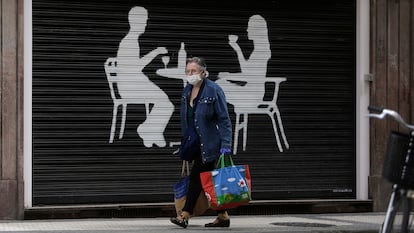‘I am opening to get the country going, but I know it’s not profitable’
Small businesses in Spain are preparing to receive customers under Phase 0 of the deescalation plan, but there is uncertainty over safety protocols
Jadir Azougagh’s phone hasn’t stopped ringing since the government announced the deescalation of coronavirus confinement measures. He runs a barbershop with his brother near the Príncipe Pío metro station in the center of Madrid, and his customers have not been able to get a haircut for over a month and a half due to the coronavirus lockdown. “They were desperate,” he says.
Phase 0 of the government’s deescalation plan will come into effect today. Several provinces and islands that meet the set requirements will pass directly into Phase 1. Under Phase 0, dental and physiotherapy clinics, restaurants with take-away service, hairdressers and barber shops will be able to reopen with a maximum capacity of 30% and service by appointment only. A few hours after the government announced the plan last week, Azougagh, 34, already had 10 customers for Monday. “Work is health,” he says.
We think it is absurd that there is already an opening date without having communicated what security measures are neededAlejandro Fernández-Luengo, spokesman for the Spanish Hairdressing Business Alliance
Juanjo Melián has been disinfecting his hairdressing salon all morning in Las Palmas, the capital of Gran Canaria in Spain’s Canary Islands. “Walls, floors, furniture, appliances. Everything,” he explains. He has staggered the working hours of his staff of five so that when the salon opens on Monday, they will take it in turns to tend to customers who head a waiting list that will keep them busy for the next 10 days.
Uncertainty reigns in a sector that narrowly missed being considered “essential” during the lockdown. “Are we able to trim beards? How should we receive clients?” asks Melián. In the absence of detailed government guidelines, he is following those of his main supplier, L’Oréal.
Alejandro Fernández-Luengo, spokesman for the Spanish Hairdressing Business Alliance, criticizes the lack of information and the confusion it has generated. “We think it is absurd that there is already an opening date without having communicated what security measures are needed,” he says. As president of the Marco Aldany hairdressing chain, he says he has devised his own security measures for his salons that already have long waiting lists.
The catering industry is also beset by doubts over protocol. Teresa Rodríguez and her husband own two restaurants in Coslada, in the Madrid region, with a total staff of 27, though only one restaurant will open and one member of staff – the chef – will be working on Monday. Under Phase 0, the restaurant will only be open for customers to collect orders. But when Madrid province moves into Phase 1, Rodríguez is planning on opening the restaurant terrace, but with the specified limited capacity. “With five tables, we are not going to earn much,” she says.
Before the lockdown, the terrace catered to 16 tables and served up to 100 lunches a day. “I’m opening because we have to get the country going, but I know it’s not profitable,” she says. “The only information on how to do it so far is what the prime minister [Pedro Sánchez] has given us.” Rodríguez suffers from asthma and is worried about contracting Covid-19 from “serving hamburgers.”
“I don’t believe a demand for dentists will return”
Since the state of alarm was declared on March 14, Said Farah’s dental clinic has been practically empty. The clinic, a family business located in Coslada, Madrid, has been opening its doors to emergency patients just one day a week. “Only people with cysts have been coming,” he says. While the clinic could open normally on Monday, he is not optimistic about the prospects of patients returning. “Only people who were mid-treatment will come back,” he says.
Óscar Castro Reino, president of the Spanish Council of Dentists, says dental clinics have received specific guidelines on how to operate during the pandemic. These include banning patients coming in with company, removing magazines from waiting rooms and the constant disinfection of the premises. Access to personal protective equipment is a problem, and Farah highlights the prohibitive price of high protection masks. A few days ago, he bought 15 from a Chinese company for €55. “It’s an unsustainable expense with so few customers,” he says.

Common sense
Víctor Torres predicts that business will return gradually in his line of work. He is the healthcare director of a physiotherapy and osteopathy clinic in the Madrid district of Chamberí, which has been providing emergency services since the beginning of the pandemic. Torres hopes to open three days a week from Monday as he is already getting numerous calls from patients, but he is concerned that he has no more information on protocol than the public in general. “We feel very helpless,” he says. “Even before [entering Phase 0]. We had no clear criteria about what qualified as an emergency.”
Until now, he and his colleagues have followed the strict guidelines laid down by the Professional Association of Physiotherapists – spacing out appointments, using gloves and masks and plenty of “common sense.”
Physiotherapy colleges and WhatsApp groups of people working in the sector have been the main sources of information for 35-year-old José Luis Costa. He owns a physiotherapy and training center in the southern province Cádiz which is due to open on Monday with “everything still up in the air,” as he is still in the dark when it comes to official protocols. Costa has hired a specialized cleaning company to disinfect the clinic’s four rooms and is in the process of acquiring masks, gloves and hydro-alcoholic liquid. “They have also told us about machines that perform emergency disinfections,” he says. "But we are considering the options regarding safety and price while making sure everyone’s safety remains a priority. There’s a lot that still needs to be assessed.”
English version by Heather Galloway.
Tu suscripción se está usando en otro dispositivo
¿Quieres añadir otro usuario a tu suscripción?
Si continúas leyendo en este dispositivo, no se podrá leer en el otro.
FlechaTu suscripción se está usando en otro dispositivo y solo puedes acceder a EL PAÍS desde un dispositivo a la vez.
Si quieres compartir tu cuenta, cambia tu suscripción a la modalidad Premium, así podrás añadir otro usuario. Cada uno accederá con su propia cuenta de email, lo que os permitirá personalizar vuestra experiencia en EL PAÍS.
¿Tienes una suscripción de empresa? Accede aquí para contratar más cuentas.
En el caso de no saber quién está usando tu cuenta, te recomendamos cambiar tu contraseña aquí.
Si decides continuar compartiendo tu cuenta, este mensaje se mostrará en tu dispositivo y en el de la otra persona que está usando tu cuenta de forma indefinida, afectando a tu experiencia de lectura. Puedes consultar aquí los términos y condiciones de la suscripción digital.









































